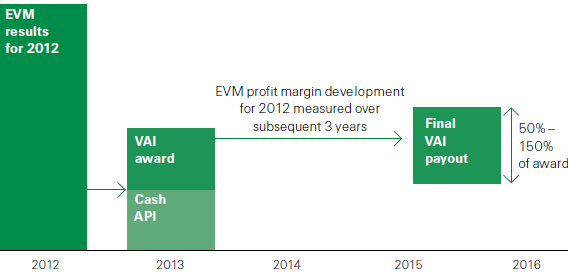Value Alignment Incentive
The VAI is a mandatory deferral of a portion of the API adding a time component to variable compensation. This supports the Group’s business model by aligning a substantial portion of variable compensation with sustained long-term results. The aim is to ensure that the ultimate value of the deferred variable compensation through VAI, though awarded for short-term performance, is significantly affected by the longer-term performance of the line of business and the Group.
The higher the total variable annual compensation, the greater the portion of variable compensation that remains at risk through the VAI, as shown in the table below.
Portion of API that remains at risk
| Download |
|
|
Deferral into VAI |
|
Group CEO |
50% of API |
|
Group EC members |
45% of API |
|
GMB members |
40% of API |
|
All other employees |
50% of the amount at or above USD 100 000 up to a maximum of 40% of API |
Value Alignment Incentive – 2012 results measured over 3 years

The payout factor of the VAI is based on the underwriting year EVM results – EVM is used to evaluate, price, reserve and steer the business decisions within Swiss Re. As EVM recognises all cash flows associated with a contract upfront, measuring the VAI over the following three years enables a clawback of VAI if performance is lower than expected; conversely, if performance is higher than expected, a premium will apply. The VAI tracks the EVM profit margin over the subsequent three years after grant. EVM profit margin is the ratio of EVM profit divided by EVM capital employed. The average EVM profit margin over the three-year measurement period is used to determine the final payout factor. The payout factor is still a linear function that ranges from 50% (for an average EVM profit margin development of –15%) to 150% (for an average EVM profit margin development of 15%).
VAI awards granted prior to 2012 contained an additional mark-up element as compensation for the time value of money. This mark-up has been eliminated for the VAI 2011 (awarded in 2012) and for VAI 2012 (awarded in 2013).
The Asset Management VAI is based in the first instance on EVM results with performance averaged over the three-year deferral period. Three times during each VAI (ie once a year), EVM results, additional targets and non-financial performance factors are taken into consideration. The annual payout factors are averaged over the three-year measurement period to determine the final payout factor. The payout factor is a linear function that ranges from 50% to 150%.
For the full three-year performance measurement period, forfeiture conditions apply. Additionally, clawback provisions apply to downward financial restatement which is caused or partially caused by the VAI participant’s fraud or misconduct. In this case, the company is entitled to seek repayment of any vested and settled award.
